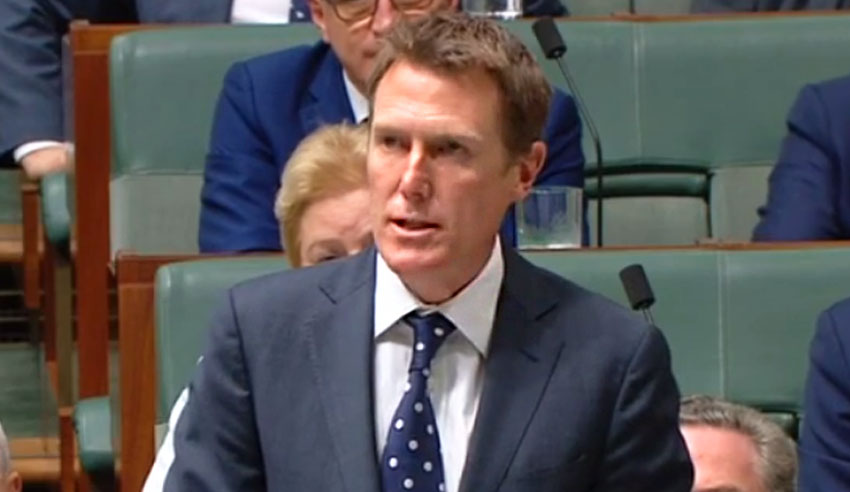Attorney-General Christian Porter has released draft legislation to establish a “powerful” new public sector watchdog, which will have “greater investigatory powers than a royal commission”.

Following the federal government’s expansion of the Australian Commission for Law Enforcement Integrity (ACLEI), a Commonwealth Integrity Commission (CIC) is set to be established, which will “strengthen and complement the existing multi-agency approach to integrity, anti-corruption and law enforcement at a federal level”, the Attorney-General’s Department said earlier on Monday.
The CIC, the A-G’s Department said, will have “greater investigatory powers than a royal commission”, including the ability to “compel people to give sworn evidence at hearings, with a maximum penalty of two years’ imprisonment for not complying; compel people to provide information and produce documents (even if the information would incriminate the person), with a maximum penalty of two years’ imprisonment for not complying; search people and their houses, or seize property (under warrant); arrest people; tap phones and use other surveillance devices to investigate them; and confiscate people’s passports by court order”.
The federal government, the department continued, has also done the “detailed design work and comparative analysis of the issues that have arisen with state-based bodies to ensure the CIC avoids the failings of those bodies. Such failings have resulted in multiple instances of unjust and irreparable harm to the reputations of innocent people”.
The aforementioned expansion of ACLEI, set for 1 January 2021, will cover four new agencies and cost $40.7 million. That funding will be absorbed by the CIC upon its commencement, with an additional $106.7 million being directed to the establishment of that watchdog.
The cumulative $147 million, the A-G’s Department said, “will ensure that corruption issues occurring across the federal public sector will be investigated appropriately by a well-resourced agency”.
The new CIC will be led by an integrity commissioner and two deputy commissioners, the A-G’s Department continued, who will head the watchdog’s separate law enforcement and public sector integrity divisions.
‘Learns from the significant mistakes of state integrity bodies’
In a statement, Attorney-General Christian Porter said that the new CIC has been given the “most significant powers and resources to detect and deter criminal activity and enhance the public sector’s long-term resilience” given the expectation from Australians that public servants be held to the highest standards of honesty and accountability.
“The public equally expects that those who come under scrutiny are not denied procedural fairness and are not subjected to trial by allegation. That is why we have taken the time to carefully consider the pitfalls that have undermined confidence in other integrity commissions to ensure innocent people do not suffer unfairly,” he proclaimed.
“The model proposed in the Consultation Bills learns from the significant mistakes of state integrity bodies and strikes the right balance between the need to protect the rights of individuals and the need to establish a powerful investigative body that can guard against potential criminal corruption at the Commonwealth level.”
Speaking about the proposals of the other major parties, A-G Porter argued: “Labor is on the record as supporting a dangerous and unjust model developed by the Greens which argues for a body that represents an NSW ICAC on steroids, without fixing any of the many well-publicised structural issues of such a model. The Greens model, supported by Labor, would see the most extreme coercive powers being used for the most minor code of conduct breaches that would otherwise be minor disciplinary matters.”
Next steps
The draft legislation comprises two bills: first, the draft Commonwealth Integrity Commission Bill, which will establish the CIC as a centralised agency to investigate criminality and corruption in the public sector; and second, the draft Integrity and Anti-Corruption Legislation Amendment (CIC Establishment and Other Measures) Bill, which makes the necessary consequential amendments to existing Commonwealth legislation to support the introduction of the Commonwealth Integrity Commission Bill, the A-G’s Department said.
It is available at the Attorney-General’s website.
The federal government is inviting feedback on the draft legislation, with submissions due by close of business on Friday, 12 February 2021. The government is committed, the A-G’s Department noted, to a “comprehensive, national consultation process on the draft legislation”.
The announcement follows calls last week from the Law Council of Australia to release the Exposure Draft of the Bill as soon as possible.
In June of this year, Transparency International Australia welcomed Mr Porter’s decision to recommit the government to the establishment of the CIC.
Two years ago, Lawyers Weekly published a podcast with shadow attorney-general Mark Dreyfus and Transparency International Australia chair Fiona McLeod SC about why Australia needs such a CIC.

Jerome Doraisamy is the managing editor of professional services (including Lawyers Weekly, HR Leader, Accountants Daily, and Accounting Times). He is also the author of The Wellness Doctrines book series, an admitted solicitor in New South Wales, and a board director of the Minds Count Foundation.
You can email Jerome at: